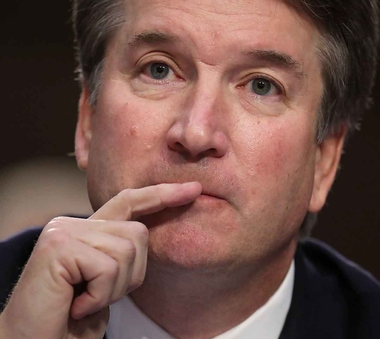What we learned about Kavanaugh's future on Supreme Court from his hearing

After a raucous Senate hearing during which he remained steady and now appears headed for confirmation, Judge Brett Kavanaugh will soon be positioned for immediate impact on the Supreme Court.
The 53-year-old judge who grew up inside the Washington Beltway would succeed retired Justice Anthony Kennedy, a California native and centrist conservative who ensured that the majority bloc did not pull the court, and the law in America, too far to the right.
Nothing in Kavanaugh's record or days of testimony suggests his approach would fluctuate like Kennedy's. It is unlikely the nominee of President Donald Trump would be the sole conservative, as Kennedy frequently was, to join the four liberals for a majority ruling on women's reproductive rights, gay marriage or other high-profile social policy disputes.
While taking pains to avoid revealing his views, Kavanaugh nonetheless reinforced key themes from his nearly quarter-century as a lawyer in Washington. The Yale law graduate rose fast, standing out among other young ambitious conservatives, making friends across the ideological divide and fostering relations with the press and law school deans.
Following are five points gleaned from his record and time in the chair before senators that signal how Kavanaugh would fit in with the other eight justices on the nation's highest court:
- He would have an instant impact. Not only would Kavanaugh secure the conservative bloc, he would come ready to be an active player. Retired Justice David Souter, who served from 1990-2009, remarked that it took him nearly five years to feel confident and comfortable at the high court. (The former New Hampshire attorney general and state judge had served only briefly on a federal bench.) Kavanaugh, a 12-year-veteran of a prominent Washington appeals court, has already demonstrated his ease with the federal issues of the high court and with its people. As a top aide to President George W. Bush, Kavanaugh had a hand in the vetting of Bush appointees Chief Justice John Roberts in 2005 and Associate Justice Samuel Alito in 2006. Kavanaugh also taught with Justice Elena Kagan, a 2010 appointee of President Barack Obama who had been Harvard law dean. Kavanaugh dropped her name throughout the Senate hearings.
- Kavanaugh is also assured in his conservatism, particularly his tendency toward suspicion of, rather than deference to, regulatory agency interpretations of federal laws. "It's all about the statute you write," he emphasized to Sen. Amy Klobuchar, a Minnesota Democrat, noting that he would not impose new requirements, for example on businesses, that Congress had not made explicit. That view, as Klobuchar noted, can limit regulatory safeguards on the job, environmental rules and consumer protection.
- Kavanaugh would vigorously engage with lawyers who stand before the court and with his fellow justices. He showed during his testimony an ability to control questions and shift the rhetoric to his advantage. In the last couple of years, Kennedy had laid back during oral arguments. A Justice Kavanaugh is likely to be a more active participant during oral arguments. That means that Chief Justice John Roberts, already working as a bit of a traffic cop with loquacious colleagues, may have a tougher job. It also means, as former US solicitor general Paul Clement noted in testimony favoring Kavanaugh Friday, an especially "hot bench."
- Kavanaugh is bound to try to demonstrate that he gets along with his colleagues. In an opening statement and throughout his testimony, he referred to the "team of nine" he would join. Kavanaugh would try to bridge substantive differences among the five conservatives (Roberts and Alito, along with Justices Clarence Thomas and Neil Gorsuch, Trump's first appointee). It is also unlikely Kavanaugh would buck some court traditions or immediately remove himself from the "pool" system by which most justices task their law clerks with screening appeals, as Gorsuch did last year. Kavanaugh also suggested he would be ready to defer to his new colleagues' attitudes about live audio recordings or cameras in the courtroom. "I know nominees who've sat in this chair in the past have expressed the desire for cameras in the courtroom, only to get to the Supreme Court and change their positions fairly rapidly," he told senators. "So that gives me some humility about making confident assertions about that."
- As he did in the hearings, a Justice Kavanaugh would likely try to balance his own independence with regard for the President who appointed him. He refused to elaborate of his views on executive power or protections for a president who might face an investigation and subpoena. Unlike Gorsuch when he was a nominee, Kavanaugh declined to even implicitly criticize Trump for his regular attempts to undermine the integrity of the federal judiciary. When asked for his view of Trump's denouncing of US District Court Judge Gonzalo Curiel, with references to his Mexican ancestry, or to Supreme Court Justice Ruth Bader Ginsburg after she criticized his candidacy, Kavanaugh demurred. He did not want "to get within three zip codes" of such political controversies.
By Joan Biskupic, CNN. The-CNN-Wire™ & © 2018 Cable News Network, Inc., a Time Warner Company. All rights reserved.
The Gayly – September 10, 2018 @ 10 a.m. CDT.





